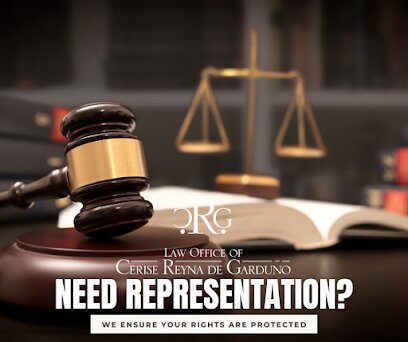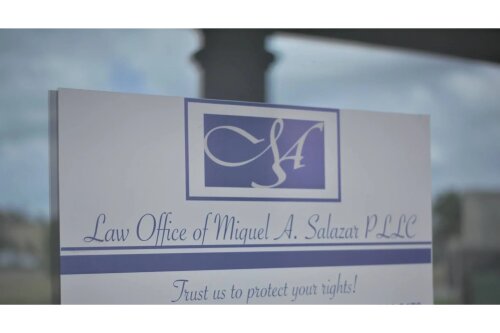Best Child Visitation Lawyers in Brownsville
Share your needs with us, get contacted by law firms.
Free. Takes 2 min.
Free Guide to Hiring a Family Lawyer
List of the best lawyers in Brownsville, United States
About Child Visitation Law in Brownsville, United States
Brownsville is in Cameron County, Texas, so child visitation matters are governed by Texas family law and enforced by local family courts in Cameron County. In Texas, visitation is commonly referred to as possession and access. Courts decide visitation based on the best interest of the child and the legal rights and responsibilities of the parents or other parties. Visitation orders can be part of a divorce, a suit affecting the parent-child relationship, or a standalone proceeding where custody or access is disputed. Many visitation arrangements are agreed between parents and later approved by a judge, while contested matters are resolved in court after hearings and evidence.
Why You May Need a Lawyer
You may need a lawyer for child visitation issues when the situation is contested, complex, or carries safety concerns. Common situations include:
- Disputes over the amount or schedule of visitation after separation or divorce.
- One parent wants to relocate with the child, and the move affects visitation.
- Allegations of abuse, neglect, substance use, or other safety concerns that could limit or modify visitation.
- Enforcement problems where a parent will not follow a court-ordered schedule.
- Requests for supervised visitation or restrictions due to court-ordered conditions.
- Third-party requests for visitation, such as grandparents or other family members seeking access.
- Paternity questions that affect legal rights to seek visitation.
- Need to modify an existing order after a substantial change in circumstances.
An experienced family law attorney can explain your rights, gather evidence, prepare filings, represent you in hearings, negotiate parenting plans, and help protect your relationship with your child while promoting the childs safety and stability.
Local Laws Overview
Key legal points to know about visitation in Brownsville and Texas generally:
- Best-interest standard - Texas courts decide possession and access based on what best serves the childs physical and emotional needs, stability, and welfare.
- Conservatorship - Texas recognizes parental rights labeled as conservatorship. The court can name one or more parents as possessory or managing conservators, which affects decision-making authority and visitation rights.
- Standard Possession Order - Texas has a commonly used Standard Possession Order that sets out typical visitation timing for non-primary parents. Judges often use it as a starting point, but they can tailor orders to a familys unique circumstances.
- Relocation rules - Parents who want to move a child out of the county or a substantial distance usually must provide notice to the other parent and sometimes obtain the courts permission. Relocation can trigger modification proceedings.
- Modification - To change a visitation order, a party generally must show a material and substantial change in circumstances or other legal grounds recognized by the court and demonstrate that modification is in the childs best interest.
- Enforcement - Courts can enforce visitation orders through contempt proceedings, make-up visitation, fines, and other remedies when a court-ordered schedule is violated.
- Supervised visitation and safety measures - Courts can order supervised visitation or require exchanges at neutral locations when safety or welfare concerns exist. Protective orders and criminal convictions relating to domestic violence can affect visitation rights.
- Third-party rights - Under certain conditions, grandparents and other third parties may seek visitation or access, but courts balance third-party requests against the childs best interest and parental rights.
Frequently Asked Questions
What is the difference between custody and visitation in Texas?
In Texas, custody concepts are usually framed as conservatorship and possession and access. Conservatorship deals with legal rights to make decisions about the child, while possession and access describe the schedule of physical time the child spends with each parent. Courts may assign managing conservatorship to one or both parents and establish possessory conservatorship or a visitation schedule accordingly.
How does the court decide a visitation schedule?
Judges evaluate the childs best interest by considering factors such as the childs age, emotional and physical needs, existing relationships, parental ability to care for the child, history of family violence or abuse, and stability. The Texas Standard Possession Order often serves as a baseline for non-primary parents, but courts can modify the schedule based on the familys circumstances.
Can visitation be supervised or restricted?
Yes. If there are credible concerns about a parents behavior, substance abuse, mental health, or violent history, the court may order supervised visitation or impose restrictions like exchanges at neutral locations, supervised contact centers, or limited communication. Supervised visitation is intended to protect the childs safety while allowing contact when appropriate.
What if the other parent is not following the court-ordered visitation schedule?
If a parent refuses to follow a visitation order, you can ask the court to enforce the order. Remedies may include filing a motion for enforcement, requesting make-up visitation time, seeking contempt charges, fines, modifications, or other sanctions. Document missed time and keep records of communications and attempts to resolve the issue.
How can I modify an existing visitation order?
To modify an order, you generally must file a petition with the court and show that circumstances have materially and substantially changed since the last order, or demonstrate another legally recognized reason for modification. The court will again consider the childs best interest before approving a change.
Can grandparents or other relatives get visitation rights?
Grandparents and certain third parties can request visitation in Texas, but they must meet statutory criteria and persuade the court that visitation serves the childs best interest. Courts carefully balance the parents constitutional rights with the potential benefits of third-party contact for the child.
What happens if a parent wants to relocate with the child?
Relocation can significantly affect visitation. A parent planning to move should follow notice requirements in the law and, if necessary, seek court approval. The non-moving parent may oppose relocation and ask the court to modify the possession schedule or block the move if it is not in the childs best interest. Courts look at factors such as reasons for the move, impact on the childs relationship with the other parent, and the childs needs.
Do I need to establish paternity before seeking visitation?
Yes, establishing paternity is often a prerequisite for a biological father to obtain visitation rights if the parents are unmarried. Paternity can be established voluntarily by signing an acknowledgment or administratively or through DNA testing and a court order if contested.
How long does a typical visitation case take and how much will it cost?
Time and cost vary widely. Uncontested cases with agreed parenting plans can be resolved in a few months and cost less, while contested cases with hearings, discovery, and expert evaluations can take many months or longer and be more expensive. Costs include court filing fees, attorney fees, mediation, custody evaluations, and possible supervised visitation service fees. An attorney can provide a more specific estimate based on the case facts.
What should I do immediately if I fear for my childs safety with the other parent?
If you believe your child is in immediate danger, contact local law enforcement and seek emergency protective measures. You can ask the court for an emergency order restricting access or for supervised visitation pending a full hearing. You may also contact Child Protective Services if abuse or neglect is suspected. Document incidents and seek legal counsel quickly to protect the child and preserve evidence.
Additional Resources
When seeking help in Brownsville, consider these local and state resources:
- Cameron County family courts and the district clerk - for filing information, court calendars, and local court procedures.
- Texas Family Code - the body of state law that governs conservatorship, possession, custody, and visitation.
- Texas Department of Family and Protective Services - for reporting suspected abuse or neglect and accessing protective services.
- Texas Legal Aid organizations - for low-income persons who need help with family law matters. Local providers may include regional legal aid offices serving the Rio Grande Valley area.
- State Bar of Texas - for lawyer referrals and information on finding qualified family law attorneys.
- Local counseling and parenting programs - often court-ordered or court-recommended resources that help parents develop parenting plans and manage co-parenting stress.
- Family violence shelters and domestic violence advocacy services - if safety is a concern, these organizations provide immediate assistance and guidance on protective orders.
Next Steps
If you need help with child visitation in Brownsville, consider these practical next steps:
- Document the situation - keep calendars, communication records, school and medical records, photographs, and any evidence relevant to the childs welfare and visitation issues.
- Consult a local family law attorney - seek an initial consultation to understand your rights, likely outcomes, and possible strategies. Choose an attorney experienced in Texas family law and familiar with Cameron County courts.
- Explore mediation or negotiation - many disputes can be resolved through mediation, which is often faster and less expensive than trial. Courts frequently encourage or require mediation before a contested hearing.
- File the appropriate petitions - if you need an order establishing, modifying, or enforcing visitation, your attorney will prepare and file the necessary paperwork with the family court.
- Protect immediate safety - if the childs safety is at risk, contact law enforcement, Child Protective Services, and seek emergency protective orders from the court.
- Prepare for court - gather witnesses, documentation, and any professional evaluations that support your position, and follow court rules and deadlines.
- Follow court orders - adhere to any existing orders while the case proceeds. Failure to comply can harm your case and lead to enforcement actions.
If you are unsure where to start, a phone call to a reputable local family law attorney or a legal aid intake line can help you identify urgent steps and make a plan tailored to your familys circumstances. The courts decisions focus on the childs best interest, so documenting stability, safety, and the childs needs will be central to any successful visitation case.
Lawzana helps you find the best lawyers and law firms in Brownsville through a curated and pre-screened list of qualified legal professionals. Our platform offers rankings and detailed profiles of attorneys and law firms, allowing you to compare based on practice areas, including Child Visitation, experience, and client feedback.
Each profile includes a description of the firm's areas of practice, client reviews, team members and partners, year of establishment, spoken languages, office locations, contact information, social media presence, and any published articles or resources. Most firms on our platform speak English and are experienced in both local and international legal matters.
Get a quote from top-rated law firms in Brownsville, United States — quickly, securely, and without unnecessary hassle.
Disclaimer:
The information provided on this page is for general informational purposes only and does not constitute legal advice. While we strive to ensure the accuracy and relevance of the content, legal information may change over time, and interpretations of the law can vary. You should always consult with a qualified legal professional for advice specific to your situation.
We disclaim all liability for actions taken or not taken based on the content of this page. If you believe any information is incorrect or outdated, please contact us, and we will review and update it where appropriate.










